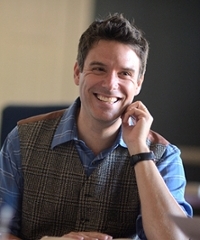
Gregory Heyworth
- Associate Professor of English
- Director, Lazarus Project
PhD, Princeton University
- Office Location
- 408 Morey Hall
- Telephone
- (585) 275-2548
Research Overview
Gregory Heyworth is a medievalist and founder of the discipline of textual science, a combination of the traditional scholarly skills of paleography, codicology and bibliography, with material-, imaging-, and data-science. With secondary appointments in History and Computer Science, Heyworth's research lies primarily in the recovery of damaged manuscripts and cultural heritage objects using spectral imaging and machine learning, as well as in the editing of texts, the history of the book and of cartography, and classical influence upon insular and continental romance and satire of the Middle Ages. More colloquially, he is interested in finding ways to read books no one has read before, and in teaching others to do the same.
As director of the Lazarus Project, he and his students have worked to recover manuscripts, maps, and paintings in collections around the world and to make them available to scholars and the public. Current initiatives include the Vercelli Schoolroom Project, the Dresden Baroque Music Project, the 1492 Martin Behaim Globe in Nuremberg, the Laja Alta Bronze Age Cave Paintings in Jimena de la Frontera, Spain, and the Icons of Svanetia in Mestia, Georgia.
Selected Publications
- “New Light on the Vercelli Book: Textual Science and the History of the Book,” in Old English Tradition: Essays in Honor of J. R. Hall, ACMRS (2016)
- “Initial inspection of reagent damage to the Vercelli Book,” with Ira Rabin, and Oliver Hahn, Comparative Oriental Manuscript Studies 1.1 (2015)
- Les Eschéz d'Amours: A Critical Edition of the Poem and its Latin Glosses, with Daniel O'Sullivan, Brill (2013); vol. 2 in preparation for 2017
- Desiring Bodies: Ovidian Romance and the Cult of Form, Notre Dame (2009)
- "Ineloquent Ends: Simplicitas, Proctolalia, and the Profane Vernacular in the Miller’s Tale,” Speculum 84:4, 2009
- “Textual Identity and the Problem of Convention: Recovering the Title of Dresden Oc. 66,” Textual Cultures 1:2, 2006
- “Missing and Mending: Romeo and Juliet at Play in the Romance Chronotope,” Shakespearean Criticism 76, 2004
- “Love and Honor in Cligès” Romania 120, 2002
Honors
- Kress Foundation Grant, Hunt-Lenox Globe, 2015
- National Endowment of Humanities Grant, Martellus Map, 2014
- Choice Outstanding Academic Title for Desiring Bodies, 2010
- National Center for Preservation Technology and Training Grant, “Portable Multispectral Imaging Lab,” 2010
